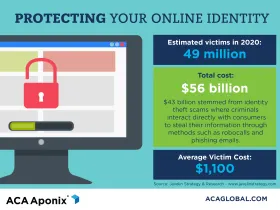2025 ACA Conference
Join us in sunny Orlando, Florida for ACA's 2025 Conference, "Preparing Today, Protecting Tomorrow," where industry leaders and experts will converge to explore the evolving landscape of financial services.
Payment fraud threats have become a major concern for organizations globally, with more than 80% of financial professionals reporting incidents of attempted fraud*. Payment fraud trends globally reflect a continued and sustained growth over the past 4 years.
Organizations are more aware of increasing threats and many have actively implemented control measures. Unfortunately, this added vigilance is not always enough. New technologies are streamlining electronic payments, but perpetrators are using those same solutions to attack payment processes and platforms. The tactics used by fraudsters evolve and increase in sophistication continually, attempted attacks are becoming harder to identify resulting in greater success infiltrating organizational payment flows.
As well as the obvious financial impact, fraudulent incidents may subject firms to additional regulatory scrutiny, privacy concerns, reputational damage, litigation and loss of clients/investors. In addition, post-breach remediation costs can be extremely high. It has become essential that firms are proactive in predicting and assessing their exposure to these threats in order to mitigate the likelihood and impact of a payment fraud incident.
*2019 AFP Payments Fraud and Control Survey
Aponix Protect helps firms address evolving cyber risks and threats to ensure that their cybersecurity needs are covered year-round. This solution is available in three tiers, each one designed to provide firms with a flexible, robust, responsive, and cost-effective cybersecurity program.

Passwords are the most common method of authentication, but remembering a unique password for each account you have can be a pain. Here are ACA Aponix's best practices for creating and managing passwords to help protect your accounts from a cyber-attack.

Our homes are becoming increasingly connected to the outside world through "smart" devices, which work together over your Wi-Fi network to make your home more comfortable, safe, and convenient. Common smart devices include thermostats, televisions, light bulbs, and surveillance systems.

As cyber security attacks continue to increase in frequency and complexity alongside evolving technologies, the COVID-19 pandemic, and remote work and school, it is essential to prioritize protecting your identity online. Here are some ways you can control the amount of personal information that is available online.

The recent increase in high-profile cyber incidents have put millions of people around the world at risk for identity theft and other cyber-crimes. This blog post contains tips and information you can share with your family and friends about staying safe online.

We're pleased to announce that we've again partnered with the National Society of Compliance Professionals (NSCP) to provide financial services firms with an opportunity to gain insight into cybersecurity compliance programs across the industry.

Our Ransomware 101 blog series addresses multiple aspects of the ransomware issue, including what you should know and what you should do to protect your firm, your clients, and your finances. In part one, we discussed the evolving and growing threat of ransomware. In this article (part two), we’ll provide a framework for what your organization can do to prevent and detect ransomware attacks.
ACA Group Acquires Global Trading Analytics to Offer Clients Leading Transaction Cost Analysis Capabilities
Five ACA Group Leaders Recognized Among the 2&20 Top 100 Most Influential People in the Service Provision for Alternative Investment Firms
ACA Group Recognized as RegTech100 Company for Fifth Consecutive Year
Join us in sunny Orlando, Florida for ACA's 2025 Conference, "Preparing Today, Protecting Tomorrow," where industry leaders and experts will converge to explore the evolving landscape of financial services.